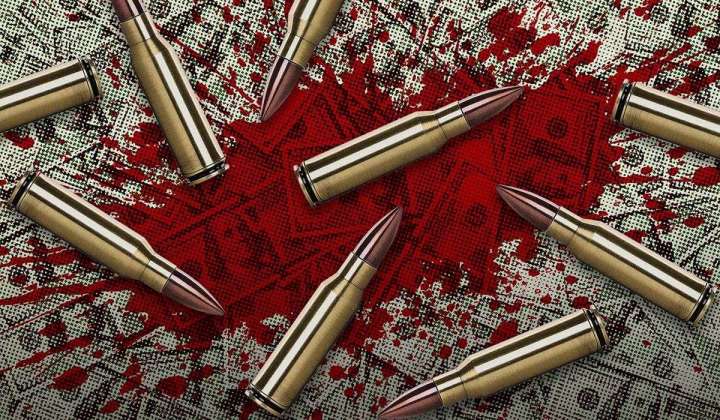Ukraine sacrifice for Western support justifiable in defeating Russia

OPINION:
As we enter the second year of war in Ukraine, the battle in the eastern portion of that country is a testimony to the horror and violence of a conflict that the Russians initiated.
“Meat grinder” is the term soldiers use to describe the nature of fighting in and around the Ukrainian mining city of Bakhmut. Once a salt mine metropolis of 71,000, it is now an open-air morgue of rotting Russian corpses left among its ruins by an invading army that has thrown itself at overstretched Ukrainian patriots defending Bakhmut to the death.
The human wave attacks launched against Ukrainian defensive positions are often populated with recently enlisted Russian prisoners or criminals who sometimes have entrenching shovels as their only weapons. Ukrainians mow them down in vast numbers. Unfortunately, the stalwart Ukrainians have taken enormous casualties of their own as they continue to defend their last hold on Bakhmut’s western outskirts while Russian forces attempt to encircle them. For those facing this fight on both sides, it might as well be Armageddon. It is a bloody affair.
Thus far, Ukrainian war losses approach 120,000 killed or wounded, compared with 161,000 Russian casualties, whose massive population permits them to enlist even greater numbers than Ukraine can muster. Moreover, Ukrainian ammunition stocks are dwindling.
International press reports have noted that “pessimism from the front lines to the corridors of power in Kyiv” is rising. Unfortunately, that pessimism has been fueled by an episodic hesitation by the U.S. and the West to provide necessary military equipment to Ukraine in a timely fashion. If that continues, a spring counteroffensive by Ukraine might be jeopardized.
All isn’t lost for Ukraine. Its fighters are stolid, retaining an admirable elan amid hardship. But despite their public optimism of victory in 2023, Ukraine’s leaders are worried that Western support is waning, even as more U.S. and NATO armaments and munitions creep toward the battlefield.
Col. Gen. Oleksandr Syrsky reflects his leadership’s optimism but is cautionary: “Generally, we all think the same, and we understand that for us it is of course necessary to win by the end of the year. And it is real. It is real if we are given all the help which we have been promised by our partners.”
That is in doubt. The political voices of isolation in America are dampening financial support for Ukraine at a time when victory is in the balance. Many in Congress assert that support for Ukraine must stop. Better, some think, to invade Mexico and destroy drug cartels there. That’s ironic. Yet Ukrainian war weariness is on the rise among Americans, who believe that there are other priorities at home that must take precedence over defeating the Russian army in Ukraine.
There’s another irony to consider. Throughout the Cold War, American and NATO strength was financed and assembled to deter or defeat a Soviet invasion of Europe. That war did not happen because Moscow saw determination by the West. Moreover, in 1991, the Russians witnessed the effectiveness of an allied force as it crushed their surrogates — the Iraqis — in the Gulf War.
The irony? Many of the weapons that were designed for the Cold War were used in the Middle East against Russian-equipped, Russian-trained Iraqi forces. And improved versions of those systems are at work to defeat the Russian behemoth today. At issue is whether the Russians once again see sustained determination by the West, Or will war weariness weaken our resolve and enable an eventual Russian victory over an exhausted Ukrainian army? For the sake of world peace, let’s not hope for that outcome.
In his funeral oration for Pericles, the Greek historian Thucydides said of his fellow countryman, “The bravest are surely those who have the clearest vision of what is before them, glory and danger alike, and yet notwithstanding, go out to meet it.”
The Ukrainians are doing just that.
They understand that a Russian victory will not only destroy Ukrainian hopes for freedom but also render a devastating blow to a world order that embraces nonaggression. Ukrainians’ vision is clear. Their bravery is evident as they face their own “glory and danger alike.” American and NATO support for them is justified. Will it be sufficient?
In answering that question, Congress would do well to remember that it is Ukrainian blood, not that of U.S. and NATO soldiers, that is being sacrificed for freedom. In that regard, offering our treasure is a small price to pay to defeat an army we were once intent to vanquish during the Cold War. That same Russian aggression is at work today, threatening freedom. Ukrainian blood and Western treasure is a justifiable symbiosis in defeating Russian hegemony and revanchism against a free nation. Thucydides, I am sure, would agree.
• L. Scott Lingamfelter is a retired Army colonel, combat veteran, and author of “Desert Redleg: Artillery Warfare in the First Gulf War” (University Press of Kentucky). His new book, “Yanks in Blue Berets: American UN Peacekeepers in the Middle East,” will be released by UPK on July 4.






